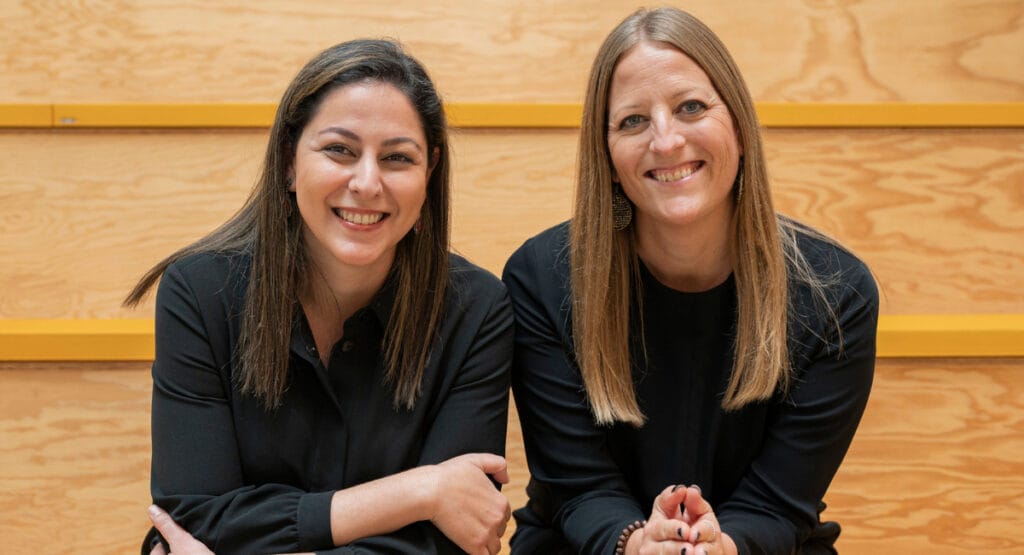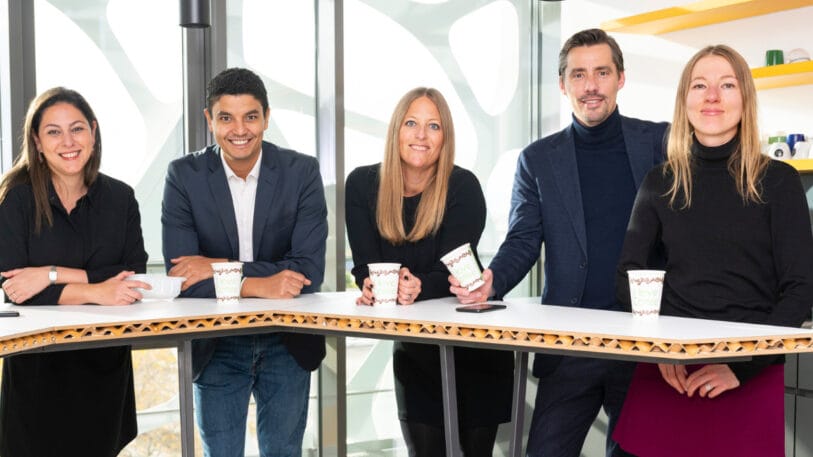Companies are faced with many difficulties today. Apart from those like the energy crisis or the never-ending fight for sustainable production, they struggle to find a competent, yet diverse and international workforce of all genders.
For Mia Pettersson and Afsaneh Nabifar, finding new talents and mentoring them are topics close to their hearts. We spoke to the two experts on biopolymers regarding how BASF is approaching the search for talented people, how they trigger their curiosity for the packaging industry and what supportive role mentoring can play.
Mia, you are leading three teams worldwide. The industry is currently confronted with the problem of finding new talent and filling open positions. How important is young talent for the industry?
Mia Pettersson: Finding young talents is crucial. Making them curious about technology requires us to be attractive. We have different events and use social media to attract diverse talent because that is really what we need. We need diversity to make us competitive and ahead of our competition. At BASF, we have many structured programs for attracting talent. We have trainee programs that we offer on different levels and in different industries. We work with many universities around the globe. When young talented people enter BASF, we have a lot of events and networking forums where we ensure that they are visible and receive the coaching and mentoring that they need. We also try to create a safe space for discussion where leaders can coach young people and also to allow these same young people to coach leaders as well. When people feel appreciated, safe, stable, they will feel motivated and deliver results, automatically.
Afsaneh, what did your experience look like?
Afsaneh Nabifar: I was first introduced to BASF in 2010 as a PhD student when I attended BASF’s International Summer Course. This fantastic event has a long tradition and has been taking place for over 70 years. PhD students from all over the globe are invited to gain an exclusive insight into BASF’s Ludwigshafen Verbund Site, the largest integrated chemical production site in the world to see firsthand what type of research and development we are conducting here. That was when I knew, that this is the company I want to work for. And so, I joined the company in 2012 after my studies. Clearly, these types of outreach programs help bring the academia and the industry together and attract talent.
Mia, on your journey through the packaging industry, did you have mentors and if yes, how important were they?
Mia Pettersson: I had a lot of mentors, and I am thankful because I was always surrounded by a lot of people who believed in me – maybe more than I believed in myself. I think this is the key. Whether it’s your parents, your manager or leader – you need to get this recognition when you try something, someone who helps you to believe in yourself. And today as a leader, I spend around 50 percent of my time on leadership topics and a big portion of that is coaching and mentoring.
Sie sehen gerade einen Platzhalterinhalt von Standard. Um auf den eigentlichen Inhalt zuzugreifen, klicken Sie auf den Button unten. Bitte beachten Sie, dass dabei Daten an Drittanbieter weitergegeben werden.
How would you define leaders at BASF? What makes them special?
Afsaneh Nabifar: I think we have a very open culture at BASF. I have had many situations in the past where I approached senior leaders and asked them if they would be willing to take me as their mentee. And even if their schedules are full of business-related responsibilities, everybody takes the time to help. There are also structured mentoring programs in the company in different business units and opportunities for mentoring partners, specifically for women. We have women in research, women in leadership, women in business, and women in production support groups where more senior-level leaders take the lead in guiding young talent during their journey. It’s really rewarding.
When thinking about recruiting talent and empowering women, do you think that the industry has changed over the last years?
Mia Pettersson: Yes, I think we have changed dramatically. And I’m very happy and proud to have been part of this transformation. We were able to get young talent and women into the company, but also to develop our leadership and our work flexibility. We are now able to work in a new way. We make it easy to work 100 percent or part-time for anyone who wants to have a family, for example, or whatever hobby it might be that conflicts with work. For this, we investigate all aspects and use a lot of flexibility to enable careers whatever your situation might be. In my team, we experiment and focus a lot on individual leadership. Together with our employees, we explore where, when and in what set-up each individual reaches their highest performance. In the end, we all have different situations and needs.
Afsaneh Nabifar: For me, it’s also interesting to see that even if BASF in Ludwigshafen is a German company, we hire a lot of international talents. I started in the research department, and I have to say that it was very fulfilling to work with so many colleagues from different backgrounds. It was almost like the United Nations. So as Mia said, it’s not only about females or males, but it’s also about mixing different cultures and character backgrounds. Because it helps to bring different perspectives together and makes the company more progressive and innovative.
Mia Pettersson: In the end, it starts from the top. Unless we live out what we say, nothing will happen. This is one of my teachings; to observe how slow topics are progressing if leaders are not walking the talk. And, to gain that trust among the people – to show them that we mean what we say as leaders – that takes time.

If young people read this, what advice would you give them to get into the industry?
Mia Pettersson: I think the chemical industry or packaging industry is abstract for many young people. So, the first advice would be to just get close to it, try it out, have courage and just see if it’s something for you. Try many things and see if you find passion for the industry. The second one is to listen to yourself and be authentic. Sometimes, there’s a lot of pressure from other people on what you should think and do and what you should not. But listen to yourself and go your own way. Do whatever your passion tells you to do. When you are there, really believe that everything is possible. If you are unsure, get coaching, find someone to talk to. And most importantly: whatever you decide to do in the end, stay curious and keep on learning, learning and learning. This world is transforming so quickly and it’s so important to find a field where you feel fire. When you find that, you’ll certainly go far.
Afsaneh Nabifar: One piece of advice I give to young people is to dare to be bold and not to be afraid to take opportunities when they knock at your door. This is true for many women. They might be afraid to take opportunities because they think they need to know a topic or a field 120 percent in-depth and accurately before they take an opportunity. Don’t be afraid. Start the ride and you will learn and gather experiences and become eventually the expert that you want to be. Do a good job, and really give your best in whatever you’re doing. I think people around will notice this and a lot of doors will open.
Mia Petterson: Mia is originally from Sweden and after receiving her degree in chemical engineering started her career in the paper industry. Today, she leads three global teams at BASF. She is Vice President of Global Business Management, Specialty Polymers. She joined BASF in 2003 and works on the company’s biopolymer portfolio.
Dr. Afsaneh Nabifar: Afsaneh is originally from Iran and got her PhD in “Polymer Science and Engineering” in Canada. She joined BASF Corporation in the US in 2012. Today, she is leading the global sustainability and advocacy team for biopolymers in Germany and is active in several plastic and paper packaging associations.


